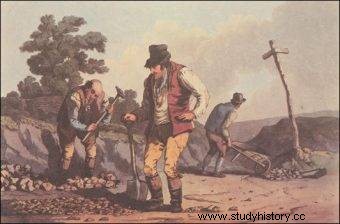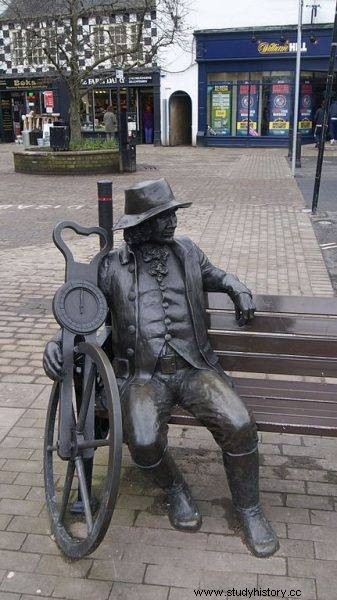If someone told you that a blind person joined the army, rode a horse, drove a stagecoach and built several hundred kilometers of roads and bridges, some of which still stand today, you would probably consider it a joke. However, the life of John Metcalf, also known as Blind Jack, is proof that being blind doesn't have to be a limitation.
John Metcalf was born in August 1717 in the North Yorkshire town of Knaresborough to a poor horse breeder. At the age of 6, he contracted smallpox and lost his eyesight. However, this disability did not prevent him from fully enjoying life and achieving success - not only in the professional field.
The talented Mr. Metcalf
The first success of Blind Jack was related to playing the violin, which he began to learn as a child. This ability was intended to provide the boy with a livelihood, but time has shown that John was quite a talented musician. While still in his teens, he performed in local hotels and taverns. But it wasn't the only thing the boy did. The loss of vision did not prevent him from swimming, diving or playing cards. He also rode horses well and enjoyed hunting. His restless soul also allowed him to get to know the area in which he lived, which often made him extra money as a guide for visitors.
He was also known for his love of women, which he attracted not only with his incredible character and skills, but also with his appearance. He met his first love, Dorothy Benson, at the age of 21, at a performance at The Granby in Harrogate. She was the owner's daughter. The young people became very passionate about each other, but the relationship ended abruptly when it was revealed that John was sleeping with another woman at the same time who was expecting his baby .
Dolly was so terrified of her beloved's marriage to another that she begged him to drop everything and leave town. This is how Jack began his journey down the Yorkshire coast to Newcastle and then to London. He mainly earned his living by playing the violin, establishing interesting contacts along the way. After many months on the way, he missed his home, to which he decided to return from the capital ... on foot.

His career as a road engineer spanned 27 years, during which he built over 290 kilometers of routes, bridges, water culverts and supporting walls.
On the spot, he found out about Dorothy's engagement to a local shoemaker and about the imminently planned wedding. However, the ceremony did not take place because John managed to convince the would-be bride to escape. Before anyone had any time to realize the situation, the couple was already married. Of course, the girl's family did not like it, but the marriage of Dolly and Blind Jack turned out to be very successful. They have four daughters.
Several years after their marriage, Metcalf continued to look for a career. Having his family to support, he joined the army, which was made easier by the connections he had gained earlier. He became an assistant sergeant in General Wade's unit and took part in the Jacobite uprising that broke out in 1745. He couldn't fight, of course, but he played violin for the soldiers during the clashes at Falkirk and Culloden. He also helped from the back end, wearing bayonets and supporting the morale of the soldiers.
John was also known for his love of gambling. With friend Colonel George Liddell he made a bet 10 guineas that he would be able to get from London to Harrogate from London faster than his companion by carriage, covering 333 kilometers along the way. And he did it in five and a half days, overtaking the colonel whose journey was delayed by the poor condition of the roads. Besides, the topic of their condition came back to Metcalf more than once.
Blind road builder
In the early 1850s, John became a carrier. He drove the stagecoach passengers on the Knaresborough - York route, and it was then that he drew attention to the problem of the surface quality. Fate wanted it to coincide with an act of the English Parliament to support the construction and reconstruction of national roads. The act allowed for the establishment of companies that were to ensure the development of infrastructure and charge fees for its maintenance. Thanks to his determination and ingenuity, Metcalf signed a contract for the construction of the section between Minskip and Ferrensby, thus starting his career as a road engineer.
The eighteenth century was a time when this branch of construction was not yet highly developed, therefore the solutions proposed by Blind Jack were quite innovative. He realized that a good road should have strong foundations. Be convex and dehydrated at the same time. So he started using the three-layer method which consisted of large stones onto which a mixture of material was poured and then all covered with gravel. Metcalf is also considered a pioneer in building paths through peat bogs for which he used raft made of heather and gorse varieties.

Blind Jack Monument in Knaresborough.
Although he employed crowds of workers for his projects, he was responsible for their creation, from measurements, through planning, to cost estimates. His career as a road engineer spanned 27 years, during which he built over 290 kilometers of routes, bridges, water culverts and supporting walls. And all this without any specialist education.
He retired at the age of 75 and moved to live with the family of one of his daughters. From then on, he led a quiet life which he ended on April 26, 1810 at the age of 92. Blind Jack was a living example that human determination can overcome many limitations ...
